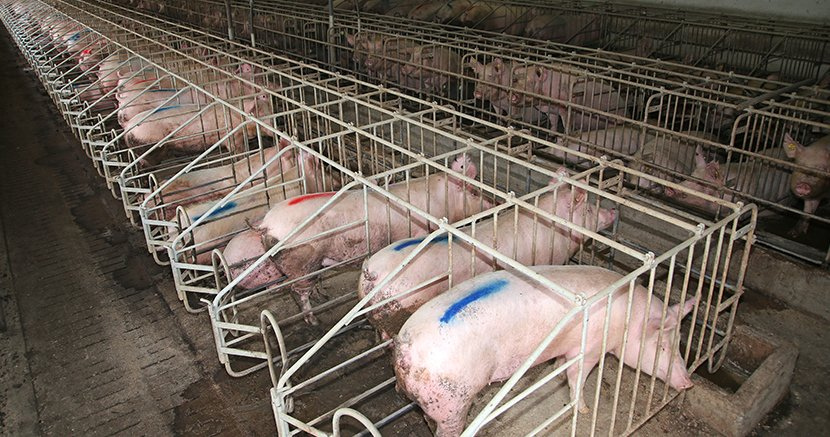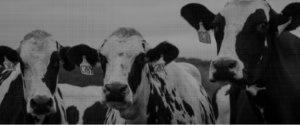Fact-Checking Smithfield’s Coronavirus Food Shortage BS
Published Apr 22, 2020

Big Ag’s biggest players benefit from making consumers think a food shortage is imminent if they’re made to shut down. Here are the facts.
Big Ag’s biggest players benefit from making consumers think a food shortage is imminent if they’re made to shut down. Here are the facts.
A local Sioux Falls, South Dakota newspaper recently ran a heart-wrenching story about the first Smithfield worker to die of COVID-19. Louisa County, Iowa, home of Tyson Foods’ Columbus Junction processing plant, is now 10th in the country in the number of COVID-19 cases per resident; the plant has reported 140 cases among workers. Dozens of packing plants and slaughterhouses across the country are now closed due to the virus which has spread rapidly among workers.
It didn’t have to be this way.
Meat Processors Like Smithfield Wanted Workers To Show Up No Matter What
Meat processing facilities are already notoriously dangerous workplaces, and are even more so during this pandemic. Plant workers and even government inspectors who work at these plants have not been given adequate personal protective equipment (PPE). Workers have reported a “work while sick” culture in many facilities, and Smithfield was literally offering workers in some plants a $500 “responsibility bonus” for not missing a day of work in April. And we know there’s no way for workers to exercise appropriate social distancing in their cramped working conditions. USDA is approving more and more requests to increase slaughter line speeds, and many plants do not offer paid time off for employees who are sick. All of these factors contribute to high transmission rates. All were completely avoidable.
And now that these facilities are closing, more and more each day, these giant corporate meatpackers are stoking fears of food shortages to advocate for premature reopening of facilities — again at the expense of workers.
Debunking Smithfield’s Claim That We’re Close To The Edge On Meat Supply
Is the closure of these slaughterhouses leaving us, as Smithfield claims, “perilously close to the edge in terms of our meat supply”?
Nope. Not at all.
The meat industry is among the most highly consolidated industries in the country, raking in profits at the expense of rural communities, small farmers, and consumers. That this industry — which has gobbled up small family farms across the country leaving thousands of wrecked rural communities in their wake — would attempt to profit off of this pandemic should surprise no one.
But something doesn’t seem quite right here.
The truth is, we have copious amounts of meat in cold storage around the country as a result of increased production, flat demand and the Trump Administration’s trade war. And we already overproduce for the sake of export — up to 30% of the pork produced in this country is destined for overseas markets but could be rerouted to shore up domestic supplies. Corporate agriculture is stoking fears of food scarcity to pressure officials, to allow them to reopen facilities quickly, and to protect their bottom line. Even USDA Secretary Sonny Perdue is in on it — carrying water for the industry as always.
But even the National Pork Producers Council, an industry group representing the interests of contract hog farmers across the country, acknowledged in a recent statement that “the loss of the food services market (i.e. restaurants) and the COVID-related slowdown in most export markets has crashed demand and overwhelmed the cold storage of meat.”
These giant multinational corporations are literally swimming in profit. China-based WH Group (which owns Smithfield) saw the value of their stock increase 32% in 2019. Tyson Foods, despite setbacks caused by a fire in a Kansas slaughterhouse, still saw a 9% growth in sales. Beef and pork exports were at record levels through February 2020 and U.S. broiler production was up 7.7% in January and February of 2020.
We’ll say it louder for the people in the back: our meat supply is not at risk.
Why Would Smithfield And Other Corporations Scaremonger About Our Meat Supply?
Is there a backup of animals on some farms that cannot be processed immediately due to slaughterhouse closures? Yes. Is there meat that had previously been destined for commercial purchasers that needs to be rerouted to grocery stores and food banks? Yes. But are we running out of meat? Definitely not.
Corporations like Smithfield routinely choose profit over public health — their business model is built on it. Let’s be clear: they are pushing to prematurely reopen slaughterhouses and other processing facilities because their closure threatens the meat industry’s profits — NOT our country’s food supply. And this callousness and greed is causing food workers to die.
We Must Demand Slaughterhouses Be Free Of COVID-19 Cases To Operate
Slaughterhouses with cases of COVID-19 must close and immediately stay closed as long as there are COVID-19 cases in their plants.
We support the common sense demands of the United Food and Commercial Workers Union and other groups that care about the safety of our workers and our food: packinghouse workers should be prioritized for testing, workers should be immediately provided with PPE and hazardous duty pay for the duration of the pandemic, there must be a halt on waivers to speed up production lines, and social distancing should be maintained when possible.
Companies must continue to pay workers for the duration of these shutdowns. And governors across the country should deploy the National Guard to supplement food distribution networks to help get (abundant) food supplies to people who need it now. These actions are necessary to protect workers health and food safety during the Covid-19 pandemic.
Your social network should see this.
Enjoyed this article?
Sign up for updates.
TO TOP





